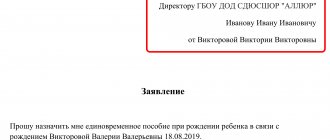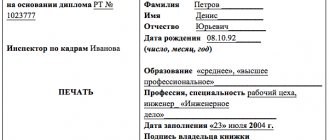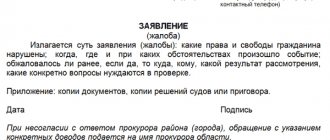What are the reasons for filing a complaint against a manager?
The primary reason why employees file complaints is a violation of labor rights, which are enshrined in the Labor Code of the Russian Federation. This is exactly the moment when management does not comply with the terms of the contract concluded with the employee and the Labor Code. Such violations include:
- regular lack of payment of wages
not providing an employee with leave- overtime that is not recorded by management in any way and is not compensated by wages
- refusal to pay sick leave funds when such an obligation is specified in the contract
- obstacle to promotion when there is every reason to do so
- dismissal for reasons not related to the work process or violation of labor regulations and contracts
A collective statement, which is drawn up by several employees, has particular weight. However, it is initially necessary to understand that there must be legal correctness on the part of the staff. Otherwise, it will affect the reputation of everyone who signs the document, and as a result will play a decisive role in the next interview.
A secondary reason, which in no way detracts from its significance, is the violation of civil human rights as such. They are not bound by a contract or labor code, but are clearly enshrined in the constitution. So, these include:
- disrespectful attitude: rudeness, sexual harassment, use of obscenities in speech
- threats causing physical or moral harm
- assault
- direct insults to staff or employee's family
Video with the rules for filing a complaint:
It is worth noting: if the complaint is not accepted, you can directly file an application with the court. This will also affect the company, but the primary dispute will be between the employee and the boss.
https://youtu.be/kJ9fVfVl6_o
Employee complaint against employee
Not everyone knows how serious consequences a person can expect for his boorish behavior at work. The following types of liability exist:
- civil law. Provides for compensation for moral damages by the offender. Article 152, paragraph 1.7 of the Civil Code of the Russian Federation indicates the right of the injured person to seek protection of his reputation in court. A Art. 152 paragraph 3.7 requires a public apology from the offender. Other articles, for example 150, 151, contain information on monetary compensation for moral damage;
- criminal Provides for criminal punishment for the offender; penalties are specified in Article 130 of the Civil Code of the Russian Federation “Insult”;
- administrative. Regulated by Article 5.61, paragraph 5 and called “Insult”
Example of unacceptable employee behavior
Note! Some individuals confuse slander with insult. These are different things and the penalties for them are also different.
Many citizens are forced to endure rudeness and insults in the workplace. Such situations, unfortunately, happen very often. Some people tolerate this and do not complain anywhere, although this behavior is fundamentally wrong. But self-confident and courageous people do not want to put up with such behavior of their work colleagues and seek justice by all existing means. First of all, they are interested in how to write a complaint against an employee who constantly insults other employees.
A complaint about an employee’s rudeness should include the following information:
- name of company;
- details of the offender, including his position;
- day and time of the incident;
- who exactly is to blame for what happened;
- describe all the details;
- set out demands for action;
- signature and date.
Important! All information about what happened should be described in detail, without any kind of slander against the offender. It is necessary to specifically indicate why exactly the actions of the offender were perceived in this way by the complaining person.
Sample complaint about boorish behavior of an employee
What exactly can be regarded as boorish behavior? A standard list of manifestations of unacceptable behavior can be given as follows:
- sexual harassment;
- behavior of a colleague that can be considered defiant (showing unacceptable gestures or provocative clothing);
- constant obscene language that a work colleague uses when communicating with employees or a client;
- rude language addressed to management or colleagues (or obscene statements);
- other employee actions that somehow disrupt the usual work process
These actions can lead to disciplinary liability and add a lot of problems to the guilty person. If a complaint has already been drawn up, then the injured person has several options for further developments:
- take the report to the head of the enterprise;
- submit an application to the prosecutor's office (if the situation is not resolved within the company);
- send the complaint directly to the court.
On a note! If the offender is a work colleague, then you should first take the paper to your boss and explain the essence of what happened. Next, the director himself must begin proceedings on this matter. He is obliged to call the offender, witnesses to the incident and listen to the arguments of all parties involved. After all the manipulations, the offender is punished, if, of course, it was possible to prove the fact of unacceptable behavior.
But, if the situation is not resolved in any way within the enterprise, then you can safely file a lawsuit, because this action can be regarded as protecting your rights. But, as elsewhere, it is the arguments that play the key role; without them there is nothing to do in court. So before taking such a step, you should carefully prepare and collect as much evidence as possible.
What ways are there to confirm the fact of unacceptable behavior of a colleague? To answer the question, you can give the following list:
- video recording (for example, cameras on the territory of the enterprise);
- audio recording (the offended person has a voice recorder turned on);
- presence of witnesses among company personnel.
The presence of any of the above evidence will significantly help during proceedings in court or the prosecutor's office. As practice shows, most often, a complaint against an employee does not go further than the director of the enterprise. And all because the boss tries not to “wash dirty linen in public” and not spoil the reputation of the company. This type of complaint rarely comes up in the courts; much more often one can observe claims of unlawful actions of police officers, doctors, etc.
Not many citizens know that the punishment for this kind of behavior is a fine. Based on Article 5.61 of the Administrative Code, penalties are provided for legal entities. persons, physical individuals and ordinary citizens. The amounts of punishment also vary, depending on which category the guilty person belongs to:
- simple worker - 1000-5000 rubles;
- official - 10,000-50,000 rubles.
The amount of the amount is determined by the court and depends on the severity of the situation.
Where is the document submitted?
You must submit your appeal using the “ladder” principle. It involves submitting a document not to the owner of the company, but to someone who is higher than the management. If the requirements are not met - even higher.
Despite the fact that the standard procedure involves sending it immediately to the owner of the company, it is worth using a more relaxed method. Often this is enough.
The legislative framework
The complaint process is fully regulated by a specific list of documents:
- Labor Code of the Russian Federation from 3.12.01
- Federal Law No. 294
- Government Order No. 476
- Federal Law No. 59
However, the government can make appropriate changes that may affect (add or subtract) the content of the legislative framework.
Federal Medical and Biological Agency
The Department of Supervision and Control in the Sphere of Ensuring Sanitary and Epidemiological Welfare (Gossanepidnadzor), part of the FMBA, implements the established function in relation to industries with particularly hazardous working conditions and in certain territories of the Russian Federation.
The list of organizations and territories subject to service by the Federal Medical and Biological Agency is established by Order of the Government of the Russian Federation No. 1156-r dated August 21, 2006.
Features of the complaint
All features are related to what kind of organization it is - private or public. In the first case, if the company is private and has a specific owner, then the complaint is filed in his name. However, this does not mean that the owner will personally consider it: usually this is done either by the board of directors or by lawyers appointed for this purpose. One way or another, everything depends on the hierarchy.
The success of a complaint directly depends on its content. It is important to list everything about the violation of rights as specifically as possible - the inspection officer must clearly understand what happened. We must also rely on the fact that all commercial companies are looking for profit, which means that they do not need ineffective management.
The chances of a complaint being satisfied increase significantly if the complaint justifies the benefit for the company after the dismissal of the boss.
In the second case, when the company is state-owned, there is no need to justify the potential benefits when dismissing an employee. It is only necessary to objectively and as clearly as possible describe the situation that occurred. This is required so that the relevant services can conduct a thorough check and make an informed decision based on it.
Prosecutor's office
According to Federal Law No. 2202-1-FZ “On the Prosecutor’s Office of the Russian Federation,” the responsibilities of the prosecutor’s office include oversight of compliance with the law:
- federal executive authorities;
- Investigative Committee of the Russian Federation;
- executive authorities in the constituent entities;
- local government bodies, military administration;
- heads of commercial and non-profit organizations, etc.
Based on this, you can complain to the prosecutor’s office about a boss at any level, organization or government body, including the heads of control and supervision services for compliance with labor laws.
What should it include
The appeal includes four main parts (Table 1).
| Name | Description |
| Contact form | It is necessary to indicate to whom and from whom the appeal is sent |
| Introduction | Listing of positions with mandatory indication of the name of each employee |
| Main part | The essence of the conflict is described. It should be written as detailed and succinctly as possible at the same time - this will allow a more objective assessment of the complaint from a distance |
| Requirements | The final stage is where the applicant indicates his requirements in relation to the management. They must also be clearly formulated and fully justified. |
You should also not forget about document attachments, which often require attaching a number of documents. In special cases, an application may also be rejected if a number of important documents are missing.
Video about the intricacies of filing a complaint to the authorities:
Rostechnadzor
The Federal Service for Environmental, Technological and Nuclear Supervision is included in the list of state bodies supervising compliance with labor legislation. The competence of Rostechnadzor includes issues of compliance with the requirements:
- safety protection at hazardous production facilities (mining, mining and chemical, coal, non-metallic, gas, oil, chemical, metallurgical industries, construction);
- labor protection during operation of electrical and thermal installations;
- nuclear and radiation safety.
Compilation rules
Let's briefly look at the basic rules that must be followed when submitting:
- You cannot use profanity. Personal insults are also not allowed. If these requirements are ignored, the application will not be accepted, and the applicant is deprived of the right to resolve the conflict pre-trial.
The text should be succinct. There is no need to write a long story; it is worth briefly describing the main points of the conflict and what is wrong with the accused party. It is also not recommended to use expressions and phrases that are interpreted ambiguously.
- Speech must be literate. All syntactic and punctuation rules must be observed. This will increase the speed of consideration of the complaint.
It is always worth addressing the complaint correctly - in accordance with the hierarchy. If the administrator is the boss, then you need to complain to the director, and not the owner of the company, etc. This will not only increase the speed of processing the request, but will also allow the issue to be resolved faster.
Sample complaint against the director
- Information about the manager to whom the appeal is sent and about the applicants (in the upper right corner).
- The name of the document itself.
- The introductory part must clearly reflect the relationship between the applicants and the violator of their rights.
- The main part should set out specific facts of the violations committed with references to the available evidence.
- The final part of the application contains a petition addressed to senior management to take measures against the violator aimed at eliminating violations and restoring violated rights.
The said complaint is signed by all applicants and dated. This document is official, and its arguments are taken into account during litigation, as well as during inspection activities by regulatory and law enforcement agencies, in particular, the labor safety inspectorate and the prosecutor's office. A collective complaint filed against a manager, a sample of which is given below, can be used as a ready-made example when drawing up an appeal.
If there is a need to file a collective complaint with a commercial organization, in most cases it is sent to the high management of the company, who is the owner. It will be reviewed by the owner of the company himself or by a person to whom this right will be delegated. When considering the appeal, the responsible person will, of course, rely on his subjective opinion, in connection with which the complaint must be motivated, justified and supported by “hard” evidence.
Unfortunately, there are situations in which a boss who behaves incorrectly gets away with everything, and his behavior does not entail any adverse consequences for him. To avoid this, in addition to reflecting information about personal grievances in the application, it is advisable to refer to the inevitable loss of profit of the enterprise due to the immoral actions of the boss and, as a result, discrediting the entire company.
In situations in which there is a need to appeal the actions of the immediate manager in a government structure, the team’s appeal must be written and sent to a senior manager at the appropriate level. As a rule, he is an official of a department or management of an institution.
If we are talking about violations committed by the boss in the field of labor relations, a correctly written collective complaint should be sent (possibly by registered mail) to the prosecutor's office or labor safety inspectorate. The period for consideration of the appeal is 30 days, however, this does not mean that a response to the complaint will not be sent to the applicants before this period of time.
- An introductory part containing information about the applicants, the rights that are violated by the actions of a specific person, as well as information about the violator himself.
- The main part, which includes detailed information about violations, abuses, and immoral behavior committed by the employee.
- A conclusion that sets out the employees’ demands to apply disciplinary measures to the violator.
We invite you to read: Returning from maternity leave to work after 3 years according to the law
An example of such a complaint is given below.
You need to know that an unofficial complaint about violations by both the boss and the employee, sent anonymously, is not subject to consideration and, accordingly, satisfaction.
Any collective complaint (to the prosecutor's office, local authorities, court, labor inspectorate, etc.) is written on the basis of the so-called skeleton, common to all. It consists of the following elements:
- “cap” indicating the addressee’s details and communication methods (telephone, email, postal address);
- an introduction revealing the connection of the persons filing the complaint with the violator and the reason for the appeal;
- the main part - list the facts of violations with evidence and links to legislation;
- in conclusion, put forward your demands, requests; in particular, that the situation be analyzed, assessed properly, and the violated rights restored.
Knowing how to write a collective complaint (sample below), do not forget to think about how to submit it. This can be done in the following ways:
- personally;
- by mail with a notification letter;
- through a form on the organization’s website;
- in any other way if the regulations of the relevant organization provide for this.
Important! Do not forget to write the complaint in duplicate if you submit it in person. Be sure to ask to put on it the number according to the journal of incoming correspondence and the date of acceptance, as well as the position and surname of the receiving person. This will save you from many problems in the future. If the shipment was made by mail, keep the receipt receipt that was returned to you.
The previous step, namely registering the request, is required for two reasons. Firstly, confirmation that the addressee has received the complaint, and he will be obliged to respond to it. Secondly, from the moment the document is registered, the period established by law for responding to such requests from citizens begins to count. It can be different and depends on where the claim is sent (an example of a collective complaint to the prosecutor's office below).
If your collective complaint falls under consumer rights protection legislation (purchase of low-quality goods, incompetence and rudeness of the seller, etc.), then the answer must be provided within 10 days.
When contacting government authorities or local housing authorities, you will have to wait longer. According to the legislation of the Russian Federation, 30 days are given to provide a response, counting from the date of receipt of a collective or individual complaint.
The response provided to you must contain information regarding options for resolving the dispute that has arisen, the time frame within which these actions can be implemented, or a partial or complete refusal to comply with the requirements, but with mandatory justification and reasons.
from the residents of the house
Complaint
Prosecutor of Ensk
Smart P.D.
from employees
- take action against the boss (indicate the last name, first name and patronymic of the boss),
- reimburse me for expenses incurred,
- bring to disciplinary liability;
- correct the situation.
Date, personal signature of the person filing a complaint against the boss
- if you file a complaint personally or through a representative, it must be made in at least two copies
A complaint can be filed in four ways: in person, through a representative, through a notary, or by mail.
Submission in person
If you decide to submit a written complaint in person, then you need to contact the relevant organization directly. As a rule, such complaints are received either in the office or in the reception area.
Submission through a representative
In this case, the procedure is no different from personal submission, but the representative must have a notarized power of attorney to represent interests. Thus, you will still have to go to the notary.
Filing through a notary
There is such a notarial act as the transfer of documents of individuals and legal entities to other individuals and legal entities. In accordance with it, the notary transfers applications and (or) other documents of individuals and legal entities to other individuals and legal entities. You have the right to use the specified notarial act to submit a complaint.
Submission by post
When filing a complaint by post, it is imperative that the letter be registered and with a full description of the contents.
Registration of a complaint
Complaint template
Basic rules for filing a complaint against management
Let's consider the basic principles of a complaint - registration. Full information regarding how the application should be completed is contained in Federal Law No. 59. Ignoring the registration rules is the primary reason why inspectors refuse to consider the application.
So, first of all, the home page. The upper right corner is occupied by information:
- company name
- boss details
- when registering a collective complaint - the corresponding mark
The word “Complaint” should be located in the middle of the sheet.
Now the contents of the main part:
- reason for filing a complaint: you need to provide all the details of how the rights violation occurs
- the name of the complainant or the names of those who have already suffered a civil rights violation
- indication of the date of each recorded violation
The conclusion of the main part implies a statement of the measures required by the employee in relation to his superiors. Usually this is a change in management or compensation for harm.
The final part of the document contains all the necessary documents (they are attached either in the application itself or separately), as well as the signature of the applicant. If the complaint is collective and there are too many signatures, they can be attached as a separate document.
What points should be included in the document?
A more effective tool is considered to be a complaint against the boss to the organization that is the parent structure for the enterprise. The management of a higher structure is able to calculate the possible losses that companies suffer during conflicts within departments.
It is beneficial for him to take action against a manager who violates work norms and rules. And a response to such an appeal can usually be expected within 7 days from the date of submission.
If you need to send a claim to the house management or authorities (regional or central), the response time will be longer. By law, they are 30 days, starting from the date of receipt of a collective or individual complaint.
The labor inspectorate conducts an inspection and issues a fine to both the boss and the enterprise. It also issues an order to address the problem that contributed to the violation. The prosecutor's office is able to initiate a criminal case if there are grounds for this.
It is important to protect your rights as defined by the laws of the Russian Federation. This can be done in different ways; complaints are one of the tools for such activity.
Claims cannot be abandoned, because in a situation where violations go unpunished, the problems get worse.
The most important thing is to carefully approach the collection of evidence and facts regarding the violations described in the appeal. Unfounded complaints remain ineffective; filing them is pointless; this leads to a loss of time and a deterioration in the psychological climate within the organization.
Author of the article:
We suggest you read: Complaint about illegal extension
Evgenia Dolgaya
In cases where the top management of the organization is the owner (and this is in almost all cases when we are not talking about a government organization or service), the complaint is initially written to him.
Accordingly, it will be considered by one of the leaders of the organization or persons responsible for such operations. Who exactly depends on the hierarchy in the company itself and how high the position the employee occupies, how high the boss is, how many layers of management are “above him”.
One way or another, when considering an application, the person doing this can also rely on his own subjective opinion. In other words, whether an employee’s requests will be satisfied depends only on his decision and it is unknown what will motivate it.
But in some cases this decision can be influenced. As mentioned above, management is always interested in profit. Write the text of the complaint against the boss in such a way that it suggests the conclusion that if you change the boss, the benefits will increase. For example, if the manager puts moral pressure on employees.
If you can explain that this has a detrimental effect on the efficiency of work relative to the time spent, then you will increase the chances of a successful outcome of the case. Or if the boss does not motivate employees financially, does not encourage their aspirations and does not reward them for their merits when he has the opportunity.
In theory, this knowledge is not so important, but not in practice. Unfortunately, in our realities we often encounter situations where such relationships develop between a manager and a superior person that everything is forgiven to the former. But presenting facts about the loss of benefits due to the actions of the boss or the threat of litigation will make the manager think - is his relationship with your boss worth these losses?
When it comes to a state structure, you don’t have to think much in this way - the benefit goes to the state, and not to the body that accepts such statements. However, the decision then must be made more objectively - in many cases it is possible to conduct commissions and similar investigations to prove the guilt of the manager.
State inspectorates inspect budgetary organizations with particular care.
It is worth filing a complaint against a manager to a higher organization after making an informed decision and having really good reasons for doing so. One must, one way or another, be prepared for the fact that they will consider, but the requests will not be satisfied, and the consequences of this. Roughly speaking, you need to be prepared for the situation to get even worse and for the pressure from management to increase. But this is not a reason not to defend your rights.
The statement should be drawn up as accurately as possible and not cause an ambiguous attitude towards the actions of the manager.
Here's how to write a complaint against your boss (sample below) or what points to include in the document:
- To whom is it directed? Here or f. And. O. and the position of the superior manager or the name of the body.
- Who is it sent from? F. and. O. and the position held, if it is written collectively - a listing of this data.
- Information about the violation. It is necessary to indicate by whom the rights are specifically violated, his name. And. O. and position. Full information about violations.
- Date of application.
- Signatures of employees who participated in the preparation.
Before filing a complaint, consider again - were your rights violated? Is the boss really wrong? If yes, feel free to write a statement. On the one hand, if the truth is on your side, what doubts can arise? On the other hand, if the statement is ignored, it will demonstrate the bad sides of the organization. And this will give you a reason to think: is it worth collaborating with such people?
Set yourself up correctly, don’t be afraid and don’t think that you’re doing something bad. You are fighting exclusively for your rights. If possible, convince your employees of this and write the statement collectively. Remember, no one should violate your rights, whether they are labor or otherwise.
The written response must indicate not only the proposed solution to the problem, but also the specific time frame within which this solution will be implemented. If a refusal is received in response to a collective complaint, then it must be well-reasoned.
It makes no sense to write a statement to the entire workforce at once. It is better to appoint one responsible employee who will objectively reflect all the circumstances of the case in the complaint, and the remaining employees will simply put their signatures on the finished document. Before drawing up the document, you should take the phone numbers of all employees who will sign the document. This will allow you to easily contact them if necessary to clarify details.
Collective complaint
The main distinguishing characteristic of a collective complaint is its mass nature. It is compiled and submitted by all employees who work at the enterprise. Such complaints have greater legal weight and in most cases they are paid close attention. They also initially reject the subjectivity of the complaint, because the degree of trust in the entire staff is many times higher.
If we take into account government bodies, then complaints to them are submitted to the relevant authorities and have a completely different priority - special consideration is carried out. As a rule, the consequence is a parallel inspection of the company and management by several authorities.
However, although collective complaints are noticed much more readily than individual ones, the group of people who appeal to the authority must choose a leader. She needs a person who will represent their interests and also officially cooperate with the services. The procedure after filing remains standard: an inspection is carried out, the reasons or sources of dissatisfaction are examined, and then a final decision is made.
Labor Dispute Commission
The commission is another element of internal control that resolves labor disputes between management and employees of the organization. It is formed from an equal number of representatives of the parties to the conflict on the initiative of employees or the employer and has sufficient powers to consider and resolve the problem.
The decision made in the case has legal force and is subject to voluntary or compulsory execution. In the latter case, the implementation of the resolution is carried out by bailiffs. At the same time, a party dissatisfied with the resolution of the conflict can challenge it in court.
A complaint to the commission is sent no later than three months after the occurrence (detection) of an unlawful act, and only after a preliminary contact with the offender.
The commission should not take more than 10 calendar days to consider the complaint. The decision is made by majority voting and will be implemented within 3 days.
Appeal to senior management
When filing a complaint, the first consideration will be to send it to higher management. Those who stand above the boss and determine the policy of the entire company.
The procedure for sending such a complaint involves using the legal address of the company (central office), as well as drawing up an application addressed to the general director. Thus, the sent application (often by mail) will arrive at the office. It will be reviewed by lawyers and deputy directors. If the complaint really has a strong basis, the applicant will be sent a response informing them of the next course of action. Otherwise, the complaint will be rejected, but the applicant will be sent a letter and notified of this decision.
In cases where there is no response from management, it is necessary to contact government authorities. Their appeal will be sent to the office with a priority mark and will definitely be considered. All subsequent actions, including clarification of information about the processing of the application, are also carried out through the government agency.
Grounds for complaint
Employers often violate the rights of employees and do not fulfill their direct responsibilities. Such actions are common, especially among heads of departments and divisions.
Not all inconveniences and misunderstandings within a department or division may be the basis for a complaint. There need to be compelling reasons for it. For example, these include infringement of human rights and labor rights of an employee.
The labor rights of an employee are the rights of a person who is in an employment relationship with a company or another person; they relate only to these relationships. If a person's labor rights are violated, this means that the employer is violating his duties to him.
The rights of the employee are reflected in the employment contract, they are also recorded in the Labor Code of the Russian Federation. Violation of this law or the terms of the employment contract is a reason for complaint that will not raise doubts in anyone.
Attention! Our qualified lawyers will assist you free of charge and around the clock on any issues. Find out more here.
Most often, employees make complaints about the following types of violations of labor rights:
- cancellation of the payment of well-deserved bonuses;
- refusal to carry out official registration of an employee;
- failure to provide leave;
- requirement for overtime work that is not paid. Overtime is considered to be hours exceeding the time worked under the employment contract;
- reluctance to pay sick leave, when the situation complies with the terms of the contract, the employee has the right to payments;
- refusal to advance up the career ladder, from promotion when there are vacancies, there are no arguments against a particular employee;
- an increase in the volume of work with a refusal to increase the level of remuneration;
- dismissal for reasons that are not reflected in the contract or the Labor Code of the Russian Federation, as well as due to actions that the employee did not carry out.
Some of these grounds are the direct responsibilities of the employer, while others can be attributed to controversial issues. For example, the issue of increasing wages or promoting to a higher position may be disputed by the company's management.
Remember! When filing a collective claim on any of the points, it is worth carefully considering the argumentation. We need evidence that management is downplaying the professional qualities of the employee, that it is not right in relation to specific employees. Complaints are appropriate when a person or group of employees objectively deserves benefits.
There must be one hundred percent certainty that the actions taken by management are unfair. Otherwise, it will be a waste of time: the requirements will not be satisfied. And the “rebel” will have a corresponding reputation. And it will interfere with further career advancement and worsen relationships in the team.
Violations of human rights are another group of problems that can become a reason to write complaints about the actions of management. Typically, this class includes inappropriate treatment of employees by the employer.
- showing disrespect;
- rude and boorish treatment;
- use of obscene statements addressed to an employee;
- threats and insults to the employee, his friends or relatives;
- physical aggression and assault;
- sexual harassment.
These types of complaints differ significantly from claims regarding violations of labor rights.
There are two main arguments that influence management's decision making:
- deterioration of the microclimate at the enterprise. This reduces labor productivity and negatively affects business results. The management is interested in receiving maximum benefit from the company's activities; it carefully considers such incidents;
- possibility of legal action. If a claim is ignored, the employee has the right to file a lawsuit against the direct offender and senior managers. This matter will affect the company as a whole, which will negatively affect its reputation. Usually in this situation it is easier for management to remove the offender from his position than to sue.
In the second case, it is important to draw up the document correctly. It must reflect a firm intention to take the case to court or regulatory agencies. If you remember to write about this, there will be a greater chance that management will take the side of the offended employee.
Such an application against the chief bailiff is usually submitted for the following reason. The bailiff commits a certain action in the process of work, which seems illegal to the person and which violates his rights.
We suggest you read: Protection of teachers from slander of parents
However, the chief bailiff does not share this point of view and agrees with his subordinate. In this case, a complaint is filed against the manager who, in the opinion of the person whose rights were violated, incorrectly assessed the work of the subordinate or did not want to understand the problem.
The application is drawn up in almost the same way. It is advisable to attach a document documenting the illegal actions or decisions of the bailiff. The document is submitted to the chief bailiff in the region.
The main reasons for filing a complaint are the following misconduct by management:
- fraud with employee wages (delay, non-payment, salary reduction or illegal deprivation of bonuses);
- rudeness, rudeness and insults towards their subordinates;
- inducing employees to perform duties that are not specified in their job description (or not provided for in the employment contract);
- violation of labor protection rules at the enterprise;
- sabotage of the production process;
- ignoring orders from superiors (arbitrariness, tyranny).
A complaint against a boss is most often made as a result of violations of an employee as a person or as an employee.
Based on this fact, any infringement of an employee by his employer is regarded as a direct violation of the law. All employee rights are stated in the employment agreement, as well as in the current Labor Code of the Russian Federation.
For this reason, if management is engaged in systematic violation of the labor rights of employees, then they can go to court to protect their rights, and for this it is important to know how to correctly write a collective complaint against the boss.
Often, employees complain about illegal actions on the part of an official, such as:
- refusal on the part of the director to pay the employee a well-deserved bonus;
- refusal of official employment;
- failure to provide annual leave;
- management forces workers to work beyond the norm without paying overtime;
- the employer’s refusal to provide the employee with paid leave if the signed employment contract contains this aspect;
- in the absence of compelling arguments for refusing to promote an employee up the career ladder;
- refusal to increase the salary with a simultaneous increase in the volume of work responsibilities;
- dismissal of an employee due to actions that he did not commit or in violation of the norms of the current Labor Code of the Russian Federation.
Before filing a complaint against an employer, it is recommended to carefully weigh the pros and cons, and also study the drafting sample to exclude the possibility of the document being rejected due to incorrect formatting.
Otherwise
An example of such actions by the management apparatus can be found in any organization.
It is also worth considering that this will certainly lead to a deterioration in business reputation and the final damage to relationships with immediate management.
In addition to a direct violation of the terms of the labor code and the signed labor agreement between the employer and employee, the basis for filing a complaint may be a violation of human rights. In other words, the director treats his subordinate in a rude manner.
Let's look at how to write a collective complaint against a manager. A sample complaint form must contain the following information:
- The exact name of the company.
- Full name and position title of the manager who violated the rights of team members;
- Full names and positions of employees.
- The exact reason for filing a complaint indicating the actions of the manager that violate the rights of employees.
- Description of the essence of the conflict situation.
- Date of incident.
- Making demands to senior management to resolve the situation.
- Date of application submission.
- Applicants' signatures.
What does a collective complaint against a boss look like? The sample for filling it out is similar to the preparation of an individual complaint discussed above.
Ways to file a complaint
There are four ways in which you can submit an appeal (Table 2).
| Feeding method | |||
| Personally | Representative | Notary | |
| You must contact the office or reception of the organization. | The representative of the individual must have a formal power of attorney. Submission is made to the office or reception of the company. | Applying to a notary and transferring documents through it requires a person only to formalize the document in the appropriate structure. Then the notary will take care of everything independently. | The completed complaint must be sent to the company's address at the reception using a registered letter and a mandatory inventory. |
It is necessary to choose not only the one that is simpler, but also the one that is most rational and effective in a particular case.
Registration of a complaint
An employee who works in the office of the company and is responsible for all correspondence is required to register the received request. This procedure applies equally to both private and state-owned companies. The incoming complaint number is recorded in a special journal, with the help of which you can track its processing in the future.
What are the deadlines for applying and considering an application?
The deadline for filing a complaint is determined depending on what violation was committed by the authorities. The statute of limitations for each type of offense is established individually and is located in the code.
Review of the document takes 30 days in a state-owned company; The deadline for private companies is not established by law.
Consequences of consideration of the application
The consequences that follow after consideration of the application depend entirely on the type of violation and the authority to which the application was submitted.
Thus, the head management of the company can impose disciplinary liability on the boss. The inspectorate will issue a fine, and the prosecutor’s office will initiate a criminal case. All this can affect not only management, but also the company as a whole.
However, for any sanctions to occur, great attention must be paid to the content of the document. It must be complete and clearly describe what happened. The presence of a collective complaint increases the chances of assistance from all higher-level services.
It is also worth noting that the outcome of events was when the document was rejected and the applicant was subsequently fired. Often, dismissal is illegal, although justified by regulations. In this case, it is necessary to sue the boss and also write a complaint to the general director of the organization. If the court accepts the claim and conducts an appropriate review, the applicant may receive compensation and also be reinstated in his work position. The boss can not only be fired, but also have other sanctions applied to him, including criminal ones.
Where can I send a complaint?
Typically, the recipients are regulatory authorities, the director of an organization, or the head of one of the departments. What should you do first? The team members have no choice but to write a complaint against the boss to higher management.
Senior management
It is a complaint against a negligent manager to a higher organization that will be most effective. The management will give an adequate assessment of the situation, weigh the loss of profit if a conflict arises within the team and take a set of measures against the violator.
Trade union organization
A trade union is an independent body created by workers of companies to protect their rights and interests (Article 370 of the Labor Code of the Russian Federation).
Important: Immediately contacting a trade union is one of the most effective and simplest ways to deal with a violation of rights by an employer. The organization's staff will advise the applicant and take effective measures.
Labor Dispute Commission
The CTS is formed at a general meeting of the workforce of 15 people and is approved by voting. After its formation, the team has the opportunity to protect its rights and defend its interests.
Members of such a commission have the authority to make decisions regarding situations under consideration that are subject to immediate execution.
Labour Inspectorate
A collective complaint from employees of one enterprise to the labor inspectorate is accepted on the basis of Article 356 of the Labor Code of the Russian Federation. It should be sent to the territorial office of this body with appropriate documentary evidence.
Prosecutor's office
If company representatives do not react to discord in the team, then there is nothing left to do but file a collective complaint against the manager with the prosecutor’s office. This right is regulated by Art. 10 Federal Law No. 2202.
Having accepted the appeal, the prosecutor's office conducts an official inspection to identify violations. If such facts are confirmed, the manager will be held accountable.
Court
The court is the highest authority in considering such disputes. This option is chosen if team members want to recover damages in material terms from the boss.










